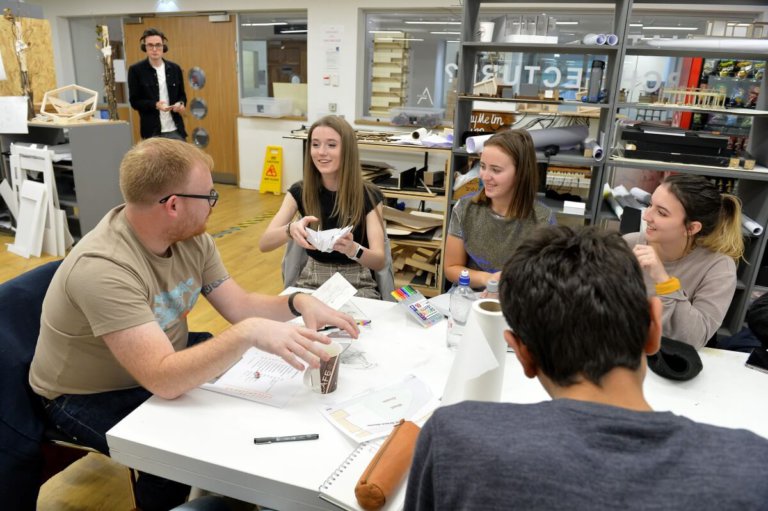
Winning the prestigious University of the Year award by Times Higher Education (THE) is no easy feat. A university must demonstrate outstanding excellence that sets them apart from the rest.
The University of Strathclyde in Glasgow, Scotland, accomplished this twice – the first time was in 2012 – by being recently named University of the Year 2019.
The title was awarded to Strathclyde for their positive impact on society, stemming from their resounding success in collaborative and innovative research centres, working closely with industry and developing Scotland’s first innovation district.
Judges poured accolades on the university. They described it as an institution that has returned to its founding vision as a “place of useful learning” and one which has “set itself the task of reviving Scotland’s traditional industrial base with a scale of ambition that has multiplied rapidly over the past decade”.
To study at its School of Architecture is not only to study at a school ranked first for Architecture in Scotland by the Complete University Guide. As the THE award shows, it’s also to study at an institution with exceptional teaching, research, student support, entrepreneurship, collaborations and outreach.
Students gain plenty from studying in a multi-award-winning university like this, such as valuable first-hand knowledge into the practices of a sustainable university, which they can leverage from and apply in their careers after graduation.

International Workshop. Photo: Yan Yuan. University of Strathclyde
Through groundbreaking research conducted here, students stand to gain the requisite knowledge and skills for an evolving profession too. Support is available throughout a student’s journey as they progress from their undergraduate programme to postgraduate, then towards their PhD as they apply their knowledge to practice with research work.
Making a difference through sustainability efforts
Exemplified in their research work is the university’s commitment to fostering sustainable practices, particularly at the Cluster for Research and Design & Sustainability (CriDS).
Here, research expertise in sustainable architecture and urbanism merges with studies on the identification of social ecologies and environmental systems for supporting resilient communities, innovations in solar design technology, improvements in health, and advances in education for sustainable development.
Their work is currently applied at the world-renowned Arcosanti urban laboratory in Arizona, US, as well as in developing social innovation networks and frameworks across the world.
Ongoing research work by CriDS include designing and building an earthquake resilient school in Nepal and developing energy and resource-efficient technologies for communities in developing countries, in collaboration with Strathclyde Engineering for Development.
There is also the Cluster for Research in Architecture and Urbanism of Cities in the Global South (CRAUCGS). Here, cutting-edge research is conducted in the socio-spatial practice of migrant and minority communities, lifestyle trends and housing transformations, urban traditions and user-centred assessment and architectural design pedagogy.
The research work also addresses the severe dualities of urban transformations and place production towards enhancing decision making and improving peoples’ lives.
The result of these clusters is in the production of quality research work that genuinely aims to improve the quality of people’s lives today as well as in the future.
Balancing research and education, there are also opportunities for students to study for a PhD, MPhil or MRes within the following advanced research areas:
- Architectural design & conservation, which deals with the challenges of properly conserving built heritage while allowing changes to adapt it to contemporary uses.
- Construction law, which deals with the legalities of the construction process including dispute resolution, regulatory enforcement, and professional ethics and corporate corruption’
- Digital construction, which aims to evaluates and develops advanced technologies, methodologies and approaches for cutting-edge Information and Communication Technologies (ICT) to improve the performance of construction industry.
- Urban design, which studies spatial structures support the complex process of development and self-organisation of cities, typical of how they have evolved and flourished.
Fostering future innovative architects
The School takes great pride in supporting students along their journey towards their future careers, whether it’s as a professional architect, researcher, or in other industries.
Students can take advantage of a wide range of Continuing Professional Development (CPD) opportunities, including courses, seminars, workshops, conferences, and research dissemination events to deepen their professional knowledge.
The CPD offers useful online courses in niche areas such as Planning, Control and Risk Management within Construction Project Environments and The Social Benefits of Innovative Lighting.
Degree programmes under the School are professionally accredited by the Architects Registration Board (ARB), as well as the Royal Institute of British Architects (RIBA).

University of Strathclyde
The BSc in Architectural Studies degree allows students to be exempted from ARB/RIBA Part 1 professional examinations, while the PgDip in Advanced Architectural Design gives exemption from ARB/RIBA Part 2.
For UK or European students, the Master’s route to ARB/RIBA Part 2 exemption is the MArch in Advanced Architectural Design, while for international students, the route is the MArch in Architectural Design (International).
There are also specialist postgraduate taught programmes that enable students to develop their passions further and gain cutting-edge knowledge and skills in rapidly growing industries.
These include the MSc/PgDip/PgCert Advanced Construction Technologies and BIM, MSc/PgDip/PgCert Architectural Design for the Conservation of Built Heritage, MSc/ PgDip/PgCert Sustainable Engineering: Architecture & Ecology, and MSc/PgDip/PgCert Urban Design.
Leading by example and providing a supportive community for students to excel with innovative Architecture studies, the University of Strathclyde is developing Architects of the future.
Follow the University of Strathclyde on Facebook, Twitter, YouTube, Instagram and LinkedIn.







